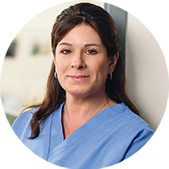
1000+
Graduates of the
R.N. to B.S. Completion Program
You already have the heart for nursing. Now you just need your RN to BS degree.
Through customized learning pathways, enhance your career and complete your bachelor’s degree in 12-24 months while working.
Boost your skills, critical thinking, and earning potential. Are you ready to go all in?
Do you need questions about the program and the admissions process answered? Reach out via email at age-admissions@roberts.edu or schedule an appointment with our Adult & Graduate Enrollment Representative.
Get More Info by clicking below to request details on our program admissions, curriculum, tuition, and more.
COURSE LENGTH
8-week semesters
PROGRAM DURATION
12 (full-time) to 24 (part-time) months
CLASS SIZE
20 students
Earn a bachelor’s degree from Roberts Wesleyan University to enhance your nursing skills, credentials, and education. This RN to BS college degree program is suited for students who are currently registered nurses who wish to broaden their professional skill set. Enroll in Roberts RN to BS program, and expand your career options within the healthcare industry. Additionally, a BS can provide nurses with educational experience to take on enhanced responsibilities and pursue roles at a management level.
PRACTICAL EXPERIENCE Through program coursework
ONLINE, ASYNCHRONOUS Format that fits conveniently into your schedule
95% OF STUDENTS are Employed Full-Time within a year of graduating
EXAM-FREE Curriculum Grades based on papers, presentations, and projects
PERSONALIZED Academic Advisement
Gain 125 non-patient-care hours of clinical practice experience throughout the curriculum.

The BS program at Roberts Wesleyan University is designed to accommodate your lifestyle with an accelerated program that can be completed in as little as 12 months.
Nurses are required to work in complex and ever-changing environments. This program will enhance your clinical and professional competenices:
Promoting Safe Nursing Practices, Quality Safety Initiatives, and Quality Patient Outcomes
Using Evidence-Based Practice to Plan and Evaluate Outcomes of Care
Forming Strategies for Health Promotion and Disease Prevention Across Patient Populations
Communicating with Interdisciplinary Teams to Lead New Healthcare Initiatives
Your courses will be taught by faculty who have nursing experience, proficiency in their area of nursing practice, and have demonstrated scholarship. You will apply the knowledge you gain to clients, families, and groups across their lifespan. Graduates from Roberts Wesleyan University with a bachelor's degree in nursing will be prepared to practice using advocacy, autonomy, accountability, ethics, and respect. Upon completion of the RN to BS program, the graduate will be a nursing professional who:
Integrates and applies nursing knowledge, and knowledge from other disciplines as a foundation for safe quality nursing practice
Provides developmentally appropriate whole person, evidence-based care that is respectful, compassionate and acknowledges preferences, values, diverse needs, and resources of the recipients of team-based care that is informed by a Christian worldview recognizing the patient is a full partner in and the source of control in team-based care.
Collaborates as a member of the interprofessional team to support and improve equitable, positive population health outcomes locally, regionally, and globally.
Applies research and evidence with the goal to improve recipient of care outcomes and transform health care in practice setting
Employs established and emerging safety principles and improvement science to provide safe, effective, equitable, whole person care and contribute to a culture of provider workplace safety.
Works collaboratively across professions and with care team members, patients, families, and communities to provide quality care.
Effectively works in teams within complex systems considering health care trends and resources across the continuum of care to advocate for recipients of care.
Applies information and communication, and informatics processes to deliver health care services in accordance with best practices, professional and regulatory standards.
Practices with accountability and integrity reflecting professional nursing characteristics and values within the context of a Christian worldview.
Participates in activities and self-reflection that fosters holistic health, resilience, and well-being, lifelong learning and the acquisition of nursing expertise and leadership skills.
As populations age, and nursing professionals retire, there is a growing demand for qualified individuals to step up to deliver quality care. Many of these professional nursing positions can be found outside of hospitals and in the community through long-term care facilities, outpatient centers, and the homes of patients.
According to the U.S. Bureau of Labor Statistics, job prospects for registered nurses are expected to grow 7% through 2029 - much faster than the average. Registered nurses also earned an average annual salary of $73,300 in 2019.
Along with this growth comes a combined demand for nurses with bachelor’s-level degrees. Here are a few in-demand careers for those who graduate with a BS degree:
Careers
Employers
Seize your opportunity to broaden your experience in the nursing field. Your RN to BS courses will foster your personal and professional development by building self-confidence, ethical values, and integrity. Through the cultivation of your professional knowledge, you can effectively communicate with patients and families.
Sources cited:
Bureau of Labor Statistics, U.S. Department of Labor, Occupational Outlook Handbook, Registered Nurses, at https://www.bls.gov/ooh/healthcare/registered-nurses.htm (visited February 2, 2021).

Graduates of the
R.N. to B.S. Completion Program

Ja'Mia Hewitt '17
Clinical Regulatory Compliance Specialist, Rochester Regional Health

Angella Watson '17
Certified Endoscopy Nurse, Newark-Wayne Community Hospital
Yes. The baccalaureate degree program in nursing and the master’s degree program in nursing at Roberts are accredited by the Commission on Collegiate Nursing Education.
With an associate’s degree from an accredited university or community college, you can complete your RN to BS program in as little as 12 months.
No. Although a registered nurse may have their BS, the qualifications are not the same. RN stands for registered nurse, which is a title given to nursing professionals who have completed educational and licensure requirements in nursing. All New York State RNs must have earned a diploma or a degree in nursing from an approved nursing program and pass a state board exam known as the NCLEX-RN, however these requirements may vary for other states.
Salaries for practicing nurses vary depending on several factors, including years of full time work experience, level of education, industry, and position.
The median annual wage for registered nurses in May 2019 was $73,300 according to research from the U.S. Bureau of Labor Statistics. In that same year, nurses in government ($79,790) and state, local and private hospitals ($75,030) were among the top earners. Additionally, ambulatory healthcare services earned $70,330, nursing and residential care facilities earned $66,250, and educational services in local, state, and private sectors earned $63,690.
Those with an RN who are considering the value in getting their BS should understand its current value and importance. Here are a few reasons why you might consider an RN to BSN program: